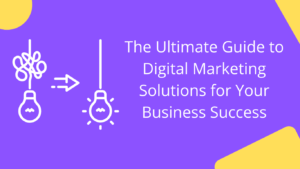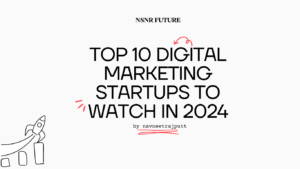Table of Contents
In the digital age, businesses are often advised to have a website as the cornerstone of their online presence. However, having a website is not the only way to succeed in digital marketing. There are numerous effective strategies to promote your brand, engage with customers, and drive sales without a website. Whether you’re a small business owner, freelancer, or entrepreneur, this guide will show you how to leverage various digital marketing channels to achieve your goals.
Why You Can Succeed Without a Website
While a website is beneficial, it can be costly and time-consuming to develop and maintain. For some businesses, especially startups or local businesses, it may not be the best use of resources. Instead, you can focus on other digital platforms where your target audience spends their time. Here are the key reasons why you can succeed without a website:
- Social Media Dominance: Social media platforms have become powerful tools for businesses to connect with customers. You can create a strong presence on platforms like Instagram, Facebook, LinkedIn, and Twitter to showcase your products or services.
- Direct Communication: Platforms like WhatsApp, Messenger, and Telegram allow for direct communication with customers. These channels are excellent for customer service, promotions, and building relationships.
- E-commerce Alternatives: If you’re selling products, platforms like Amazon, Etsy, or eBay can serve as your primary sales channels. These platforms already have built-in traffic and are designed to facilitate online sales.
- Content Platforms: Blogs, podcasts, and YouTube channels can help you share valuable content and establish yourself as an industry expert without needing a website.
Strategies for Digital Marketing Without a Website
Here are some effective strategies to market your business without a website:
- Leverage Social Media Platforms
- Instagram and Facebook: These platforms are ideal for showcasing products, running ads, and engaging with customers through stories, posts, and live sessions. Instagram’s Shop feature allows you to sell directly on the platform.
- LinkedIn: Perfect for B2B marketing, LinkedIn lets you connect with industry professionals, share content, and build your brand’s reputation.
- Pinterest: Great for visually-driven businesses like fashion, home decor, or food, Pinterest lets you create boards and pins that can drive traffic to your other online channels.
- Utilize Google My Business
- Google My Business (GMB) is a free tool that allows you to manage how your business appears on Google Search and Maps. You can post updates, respond to reviews, and provide essential information like hours of operation and contact details. A well-optimized GMB profile can drive local traffic and increase visibility.
- Sell on Online Marketplaces
- Amazon, eBay, and Etsy: These platforms allow you to list your products and reach a large audience. They also handle payments and shipping logistics, making it easier to manage your business.
- Facebook Marketplace: This feature on Facebook lets you sell products locally, and you can connect directly with buyers through Messenger.
- Use Email Marketing
- Build and nurture your email list using tools like Mailchimp, Sendinblue, or Constant Contact. Regular newsletters, promotions, and personalized offers can keep your audience engaged and encourage repeat business.
- Leverage Content Platforms
- YouTube: Create video content related to your products or services. Video marketing is highly effective and can reach a broad audience.
- Medium or LinkedIn Articles: Share insightful articles, industry news, or tips on platforms like Medium or LinkedIn. This positions you as an expert and drives traffic to your other digital channels.
- Influencer Marketing
- Partner with influencers in your industry who have a strong following. They can promote your products or services on their platforms, giving you access to their audience.
- Online Advertising
- Social Media Ads: Platforms like Facebook, Instagram, and LinkedIn offer robust advertising tools that let you target specific demographics, interests, and behaviors.
- Google Ads: Even without a website, you can run Google Ads that promote your business’s phone number, location, or other contact methods.
- Utilize WhatsApp Business
- WhatsApp Business allows you to create a business profile, automate messages, and interact directly with customers. It’s a powerful tool for customer service and direct sales.
FAQs on Digital Marketing Without a Website
Can I effectively market my business without a website?
Yes, you can effectively market your business using social media, email marketing, content platforms, and online marketplaces. These platforms can help you reach and engage with your target audience
Which social media platform is best for my business?
The best platform depends on your target audience and industry. For visual products, Instagram and Pinterest are ideal. For B2B, LinkedIn is more effective. Facebook is versatile and suitable for most businesses.
Is Google My Business necessary if I don’t have a website?
Absolutely! Google My Business is essential for local visibility. It allows potential customers to find you on Google Search and Maps, even without a website.
How can I sell products online without a website?
You can sell products on platforms like Amazon, Etsy, eBay, and Facebook Marketplace. These platforms handle the technical aspects of online sales, allowing you to focus on your products.
Can I run ads without a website?
Yes, you can run ads on social media platforms like Facebook and Instagram or use Google Ads to promote your business’s contact details or local store information.
Recommended Books on Digital Marketing Without a Website
This Is Marketing by Seth Godin
- Seth Godin’s book emphasizes the importance of understanding your audience and creating marketing that resonates with them, regardless of the platform.
Building a StoryBrand by Donald Miller
- Learn how to clarify your message and communicate effectively with your audience, a key component of any marketing strategy.
The New Rules of Marketing and PR by David Meerman Scott
- This book covers a wide range of digital marketing strategies, including those that don’t require a website.
- Focuses on building a loyal audience through valuable content, which can be done on various platforms beyond a website.
Additional Content Websites for Learning
Neil Patel’s Blog: Offers a wealth of information on digital marketing strategies, including social media and content marketing.
- Website: Neil Patel
HubSpot Academy: Provides free courses on various aspects of digital marketing, including email marketing, social media, and content marketing.
- Website: HubSpot Academy
Social Media Examiner: A leading source of insights and tips on social media marketing.
- Website: Social Media Examiner
Buffer Blog: Focuses on social media strategies and how to leverage them for business success.
- Website: Buffer Blog
Content Marketing Institute: A great resource for learning how to create and distribute valuable content.
- Website: Content Marketing Institute
Conclusion
Digital marketing without a website is not only possible but also highly effective when done right. By leveraging social media, online marketplaces, Google My Business, and other digital platforms, you can reach and engage your target audience, drive sales, and grow your business. The key is to understand where your audience is and how to connect with them effectively.
As the digital landscape continues to evolve, the importance of being adaptable and resourceful in your marketing approach cannot be overstated. Whether you’re just starting out or looking to expand your reach, the strategies outlined in this guide will help you succeed without a website.




